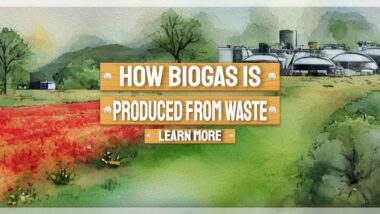Strong US Government support for Anaerobic Digestion and Biogas Technologies has now been confirmed within the “Renewable Fuel Standard Program”.
According to the US EPA’s Renewable Fuel Standard Program (RFS), anaerobic digestion and biogas technologies provide a type of advanced biofuel that is produced from organic waste.
These technologies have the ability to produce energy, reduce greenhouse gas emissions, and provide other environmental benefits.
In order to support these technologies, the RFS includes specific pathways for biogas and RNG produced from biogas, which provide credit for reducing greenhouse gas emissions.
The RFS also includes:
- guidelines for biogas reform and biointermediates, as well as
- a new methodology for biogas systems that accept food waste in addition to agricultural waste or wastewater sludge.
Benefits of Biogas and Anaerobic Digestion in the RFS Program
The RFS recognises that biogas and anaerobic digestion technologies provide numerous benefits within the RFS program. These technologies are able to reduce greenhouse gas emissions by capturing methane from organic waste that would otherwise be emitted into the atmosphere.
In more detail, the RFS has been set up on the basis that:
- They also provide a renewable source of energy and can help to reduce reliance on fossil fuels.
- In addition, biogas and anaerobic digestion technologies can help to reduce waste and provide additional economic benefits to farmers and waste management facilities.
- By diverting organic waste from landfills and utilizing it for energy production in the Renewable Fuel Standard these technologies can reduce the need for expensive waste disposal practices.

The following is the ABC's Press Release and their view of the RFS' final rules:
American Biogas Council Statement on EPA’s Final SET Rule for the RFS
 WASHINGTON – June 21, 2023 – The American Biogas Council applauds the Environmental Protection Agency’s (EPA) final rulemaking for the Renewable Fuel Standard (RFS) Program, which shows significant support for the biogas industry.
WASHINGTON – June 21, 2023 – The American Biogas Council applauds the Environmental Protection Agency’s (EPA) final rulemaking for the Renewable Fuel Standard (RFS) Program, which shows significant support for the biogas industry.
Related to biogas, the final rule includes the renewable fuel volumes for 2023, 2024, and 2025, including renewable natural gas (RNG), guidelines for biogas reform and biointermediates, and a new methodology for biogas systems that accept food waste in addition to agricultural waste or wastewater sludge.
“With EPA’s Final SET Rule, biogas systems will serve a foundational role in the future growth of the renewable transportation fuel industry, reducing methane emissions, and increasing food waste recycling,”
said Patrick Serfass, Executive Director of the American Biogas Council.
“RIN values will be strengthened and stabilized with EPA’s recognition of the strong, 20-40% RNG market growth the industry is experiencing today;
new markets will open related to the RFS with biogas now able to replace conventional natural gas to produce non-RNG transportation fuels like ethanol, gasoline, and diesel;
small farms will find it easier to build biogas systems to produce RNG by recycling food waste on site; and
the RFS will now help close the gap between federal policy on food waste and the more developed, state-based food waste recycling laws. All of this will help the biogas industry scale and achieve greater environmental protection.”
“We look forward to working with the Biden Administration and EPA to recognize biogas systems’ contribution to electric vehicles through electricity and fuel cells, and their complementary role in decarbonizing the transportation sector.
The biogas and finance industries have already shown they’re ready to act, based on the reaction to the proposed SET Rule.
Now, it’s up to the Administration to finish what Congress created and allow biogas-electricity systems to modernize and continue to decrease the carbon footprint of the US transportation.”
End of Press Release
About the American Biogas Council
The American Biogas Council is the voice of the US biogas industry dedicated to maximizing carbon reduction and economic growth using biogas systems. They represent 400 companies in all parts of the biogas supply chain that are leading the way to a better future by maximizing all the positive environmental and economic impacts biogas systems offer when they recycle organic material into renewable energy and soil products. Learn more online at AmericanBiogasCouncil.org
Conclusion: On Renewable Fuel Standard (RFS) Program Biogas Development Support
In conclusion, the US government’s support for the biogas and anaerobic digestion industry within the Renewable Fuel Standard (RFS) Program is significant and provides a pathway for the growth of these technologies.
The American Biogas Council believes that the eRIN pathway in the Renewable Fuel Standard deserves to be finalised. By activating eRINs, we will boost agricultural and city sustainability, decarbonize transportation, create domestic jobs, and actually safeguard the environment.
These technologies provide numerous benefits, including reducing greenhouse gas emissions, providing a renewable source of energy, and reducing waste disposal costs.
With continued support from the US government, the biogas and anaerobic digestion industry has the potential to significantly contribute to a cleaner and more sustainable energy future.
 WASHINGTON – June 21, 2023 – The American Biogas Council applauds the Environmental Protection Agency’s (EPA) final rulemaking for the Renewable Fuel Standard (RFS) Program, which shows significant support for the biogas industry.
WASHINGTON – June 21, 2023 – The American Biogas Council applauds the Environmental Protection Agency’s (EPA) final rulemaking for the Renewable Fuel Standard (RFS) Program, which shows significant support for the biogas industry.






It’s encouraging to see the U.S. Government fully backing anaerobic digestion and biogas technologies through the Renewable Fuel Standard Program. Their support showcases the recognition of the potential these technologies hold, not only in reducing greenhouse gas emissions but also in creating a sustainable, renewable energy source.
This is a significant step towards a more sustainable and greener future. The American Biogas Council’s approval of the EPA’s final rulemaking further solidifies the progress being made in this industry. I’m excited to see the positive impact this decision will have on our environment and economy.